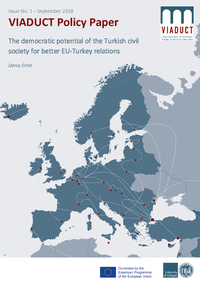VIADUCT Policy Papers
VIADUCT organises the publication of eight excellent policy papers by junior and senior academics.
The objective of the Policy Paper Series is to communicate and diffuse research results to a non-academic audience, particularly practitioners and policy makers, related to VIADUCT's four cross-sectorial issues:
- Migration and Identity (‘People’);
- Security and Politics (‘Power’);
- Energy and Economics (‘Resources’);
- the ‘EU’s Future’

This policy paper aims at examining the democratic potential of Turkish civil society and seeks to outline policy initiatives that could strengthen societal bonds between Turkey and the European Union (EU). Such measures could have a positive effect on the Turkey-EU-relations. This paper considers the necessity of fundamental support of civil society organisations (CSOs) with pro-EU attitudes, to counterbalance the one sided support of anti-EU CSOs and the democratic setbacks since 2013. The later culminated just recently in the last presidential and general elections on 24th of June 2018 with a new and more authoritarian constitution.
Bu politika belgesi, Türk sivil toplumunun demokratik potansiyelini incelemeyi ve Türkiye ile Avrupa Birliği (AB) arasındaki toplumsal bağları güçlendirebilecek politika açılımlarını özetlemeyi amaçlamaktadır. Bu tür ölçümlemelerin Türkiye-AB ilişkileri üzerinde olumlu bir etkisi olabileceği düşünülmektedir. Bu belge, AB karşıtı STK'ların tek taraflı yaklaşımlarının ve 2013’ten bu yana olan demokratik gerilemenin dengelenmesi açısından, AB yanlısı sivil toplum örgütlerinin (STK'lar) temel desteklerinin gerekliliğini göz önüne almaktadır. Demokratik gerileme, 24 Haziran 2018 tarihindeki başkanlık seçimi ve genel seçimler sonucu kabul edilen yeni ve daha otoriter bir anayasa ile son dönemde doruğa çıkmıştır.
Policy Paper No. 2 - Europeanization and De-Europeanization Process of Turkish Foreign Policy
The second VIADUCT Policy paper by Ufuk Elif Rodoplu is titled "Europeanization and De-Europeanization Process of Turkish Foreign Policy" .The paper focuses on changes in Turkey’s foreign policy in light of the framework of Europeanization. Although at the beginning Turkey was a candidate country which trying to fit it’s both domestic and foreign policy with the European Union, after 2010 it has diverged from the “EU path”. This paper aims to discuss where the Turkish foreign policy currently stands and how it has been shaped by external and internal factors. The author Ufuk Elif Rodoplu is a double degree graduate student in European Studies at Istanbul Bilgi University and European University Viadrina Frankfurt (Oder). She completed her undergraduate studies at Sabancı University in the Department of International Studies.
Policy Paper No. 3 - The EU’s Promotion of Gender Equality in Turkey: Prospects and Limitations
This policy brief draws its insights and arguments from our recently published edited volume titled “Feminist Framing of Europeanisation: Gender Equality Policies in Turkey and the EU” and reflects our years of work in the field of gender studies and the EU. It offers a feminist critique of the gender equality policies both in Turkey and the EU member states and discusses the role of the EU as a feminist actor and agenda setter inside and beyond its borders. To this end, the brief provides an in-depth examination of various sub-cases ranging from the role of civil society to policy changes in education, migration, women’s representations, feminist movements, gender-sensitive budgeting, gender-based violence and women’s leadership.
In this paper, we will analyse challenges in migration in Greece in light of recent political tensions in the Eastern Mediterranean. We will examine how current political developments reinforce securitization in detriment of human rights enforced by Greece-Turkey escalation of tension in the region. Migrants are seen as a potential security threat and this is promoted by the EU policy with violations of refugee rights, confinement, prolonged detention, extraterritoriality and dehumanization of life.
Policy Paper No. 5 - The EU´s Attitude towards Turkey - Shift of Narratives with Limited Actions? An Analysis of the Leader’s Narratives
Whoever want to understand the conflictual relations between the EU and Turkey needs to look at the official position of the European Council. The European Council announced in October that to launch sanctions if Turkey continued its “unilateral actions and provocations in breach of international law”. This issue is now due to return to the European Council's agenda in March 2021. Looking back over several decades this policy brief analyses key narratives documented in the conclusions of the European Council. Our analysis shows a considerable move over the last decades from understanding Turkey as a candidate country – perhaps with some specific characteristics due to its size – via de facto partnership documented in the spring 2016 statement to a more and more dominant narrative as problematic or even hostile neighbour with a rising number of conflicts.